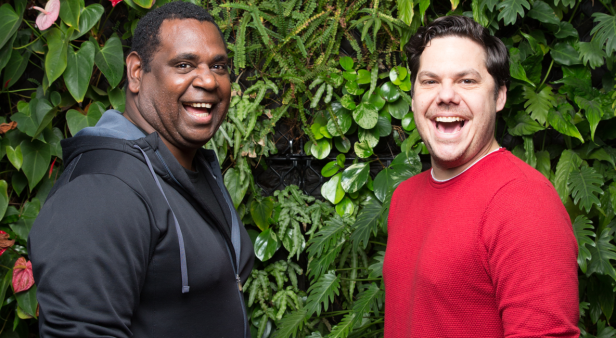To start, we’d love to know a bit more about you and how you discovered your love for the dramatic arts. What first attracted you to the world of theatre?
My mum took me to audition for plays when I was in primary school. I loved being onstage. Ultimately, I’m an introvert – so acting helped me to find and express who I am. My first role was an Aardvark. I remember really liking my tail.
Actor, director, producer – you’ve worn many hats during your career! What encouraged you to diversify your skillset, and how does each guise scratch a different creative itch?
Acting is a wonderful art form, but in this country it is a very difficult thing to do full time without having some time in-between jobs. So in order to practice and do what I need to be doing as a professional artist, I need to be working on something most of the time. It’s like being a tradesman or an athlete. Doing is the essential thing. So for me that has meant diversifying my skillset. But it also comes from a hunger to understand the art of storytelling as a whole not from one perspective.
We’re very excited to catch your upcoming production of Othello at Queensland Theatre, which you’re not only directing, but have also co-adapted alongside Jimi Bani. Before we chat about the production itself, can you tell us how the opportunity to collaborate with Jimi first arose?
I have a long association with Jimi and his family. We originally met making Jimi’s own show called My Name is Jimi, which was about his family’s history on Mabuyag Island. That show also involved his mum, grandma, brothers and his father, the late Adhi Dimple Bani. So Othello is an extension of the privilege as an artist I have been afforded to work with the Bani family.
The two of you are recontextualising the Shakespeare classic in this production, weaving in real-life events surrounding the Torres Strait Light Infantry Battalion’s involvement in World War II. We understand that Jimi has a personal connection to the story of the battalion through the involvement of his late great grandfather and his late grandfather. Can you share any insight into this piece of history and the battalion’s legacy?
Over 800 men signed up to protect the northernmost parts of Australia. Horn Island off the tip of Cape York was bombed over 300 times by the Japanese. Most Australians know that Darwin was bombed but the history of the Torres Strait’s involvement in World War II is still not common knowledge. We have used this time as a jumping off point for Shakespeare’s amazing play.
What initially attracted the two of you to the idea of using Othello as a vehicle to discuss this part of our country’s history and Jimi’s Wagadagam culture? Was there any obvious common ground that the story of Othello and that of the battalion shared that made it a natural fit?
The power of language, ownership of language is so integral to Shakespeare lovers and to speakers of traditional languages. When Torres Strait Islanders hear language, it has power and resonance with everything that has come before. It is the same with Australians of European decent. When we hear Shakespeare it resonates a power which speaks to everything that has come before us. Uniting Kala Lagaw Ya (language for the western part of the Torres Strait) and Shakespeare has brought about an amazingly powerful experience.
In what ways has changing the setting from Venice to Far North Queensland and the Torres Strait allowed you to steer the story in ways that not only underscore the play’s original themes and ideas, but also convey new ones?
There is so much common ground between the play and Australia in 1942. Women and indigenous people had more freedom and could be paid. It was a time of progressive thought because the necessity of war demanded it. Unfortunately after World War II these freedoms and independence retracted again. This backdrop has given the play a deep place from which to breathe. Our version allows for Australian audiences to see themselves in the work.
From a directorial standpoint, how has this production process differed from other works you’ve helped bring to the stage? Are there any aspects you’ve found to be particularly fulfilling, creatively?
It is not much different to other works, but tackling a play like Othello is a large task. It’s like someone preparing to play Beethoven or Bach, a healthy respect for the material is required. One of my favourite moments in the theatre happened at the Cairns Indigenous Art Fair when we played there. During a preview we invited a lot a school students to see the production. After a scene between the characters of Cassio (Benjin Maza)and Bianca (Tia-Shonte Southwood) which is in Yumpla Tok (the creole of Torres Strait) a young Torres Strait Islander in front of me turned around mouth agape. After the show she said she saw herself. Saw herself in Shakespeare. And that she was part of literary tradition. It was an amazing moment.
What do you hope Othello audiences take away from their theatre-going experience?
The play begins as a celebration of language, dance, song, comedy and acting but it quickly becomes a fast paced psychological thriller. It’s a really entertaining rollercoaster ride that affirms our collective history as Australians, no matter what our skin colour.
Othello will be running at Queensland Theatre’s Bille Brown Theatre from Saturday September 10 to Saturday October 1. Head to the Queensland Theatre website to nab your tickets.
